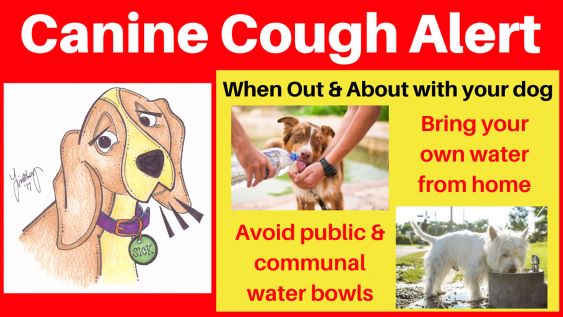Pets and Their People Blog
What Is Canine Kennel Cough?

Symptoms & Prevention*
Canine cough, or kennel cough, are lay terms for Canine Infectious Respiratory Disease Complex (CIRDC). There are many bacteria and viruses which can cause this illness. However, the most prevalent of the bacteria that cause this illness is Bordetella bronchiseptica. This illness involves an inflammation of a dog’s trachea and upper bronchi, similar to bronchitis in a human. The air flowing over the inflamed tissues can be very irritating, which causes the dog to cough.
*Editor’s note: This information does not replace the advice or instruction given to you by your veterinarian.
Transmission of Canine Cough
Canine Infectious Respiratory Disease Complex is highly contagious to other dogs. It can be transmitted through the air from one dog to the next or even in the grass where you walk your dog. In Maine, we often see an annual outbreak of canine cough when the weather gets nice, and people are out and about with their dogs. They may be visiting the dog park or walking around town, where well-meaning businesses put out water bowls for dogs. I believe these communal water dishes may be a significant factor in transmitting this highly infectious disease. Therefore, I encourage you to bring your water from home when out and about with your dog or purchase bottled water. Also, avoid letting your dog drink from standing water found in public ornamental pools or puddles, as these water sources can harbor canine cough and many other organisms that can make your dog sick.
Canine cough is transmitted the same way as the “common cold” is transferred from one person to another. Like people working with the public or school children, the more dogs your dog associates with, especially those unvaccinated, the greater the opportunity to contract canine cough. That’s why the canine cough vaccine is often recommended for dogs that; frequent the dog park, attend daycare, are boarded or groomed, are in a training class, go to dog shows or dog sport events, visit the veterinarian frequently, or are just around lots of other dogs. In addition, most boarding kennels, daycares, and training classes require guests to be vaccinated for CIRDC.
Vaccination May Reduce the Severity of Symptoms
There are different types of vaccines for canine cough/CIRDC; however, because there are so many infectious agents that can cause the disease, a dog can be vaccinated and still get the disease. However, the vaccines do often reduce the severity of the disease. Vaccines can be injectable or given orally or intranasally (via the nose). Dr. Ronald Schultz (Professor and Chair of the Department of Pathobiological Sciences at the School of Veterinary Medicine at the University of Wisconsin-Madison) recommends that dogs around other dogs be vaccinated annually with the intranasal vaccine that immunizes against Bordetella. Since the typical path of infection for these diseases is via the respiratory system, Dr. Schultz feels the intranasal approach, which immunizes via the respiratory system, is the most effective way to administer this vaccine.
A Cough that Sounds Like a Goose “Honking”
The most typical symptom of canine cough is a persistent dry cough that almost sounds like your dog is “honking” like a goose. When we adopted our dog Shed from the Dane County Humane Society many years ago, she started showing symptoms of canine cough in a few days. I remember waking up in the middle of the night to hear a flock of geese “honking” under the bed. Most of the time, your dog will appear healthy except for the cough. They’ll eat normally and will still be active. However, they may gag and produce white foamy phlegm. In addition, exercise and pressure from their collar against their trachea (from pulling on the leash) may cause a bout of coughing.
If your dog is coughing repeatedly, taking them to the veterinarian is a good idea. While canine cough often resolves on its own, there are several other infections, as well as cardiac issues, that cause coughing, which can be fatal if not treated. In addition, pneumonia can result as a secondary infection to canine cough. Typical treatments for canine cough include a cough suppressant and possibly antibiotics, as secondary infections can occur from canine cough. You must also keep your dog away from other dogs while they have canine cough to prevent them from spreading the disease.
About the Author

Don Hanson lives in Bangor, Maine, where he is the co-owner of the Green Acres Kennel Shop and the founder of ForceFreePets.com, an online educational resource for people with dogs and cats. He is a Professional Canine Behavior Consultant (PCBC-A) accredited by the Pet Professional Accreditation Board (PPAB) and a Bach Foundation Registered Animal Practitioner (BFRAP). Don is a member of the Pet Professional Guild (PPG), serving on the Board of Directors and Steering Committee and chairing the Advocacy Committee. He is also a founding director of Pet Advocacy International (PIAI). In addition, Don produces and co-hosts The Woof Meow Show podcast, available at http://bit.ly/WfMwPodcasts/, the Apple Podcast app, and Don’s blog: www.words-woofs-meows.com. The opinions in this post are those of Don Hanson.
©29-May-23, Donald J. Hanson, All Rights Reserved
< Click for Copyright and Use Policy >

